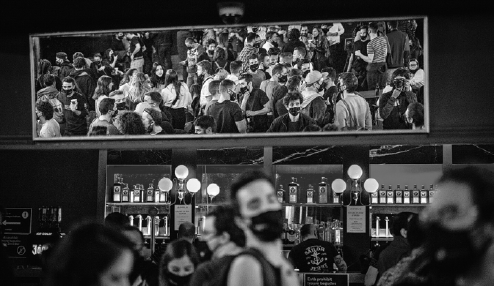Japan, S. Korea leaders on back foot
Cases surge hits new PM's poll ratings, while strains follow clamps in Seoul

TOKYO/SEOUL-Japan and South Korea grappled with surging coronavirus cases and growing public frustration on Monday as Japan's prime minister suspended a contentious travel subsidy program while South Korea ordered schools to close from Tuesday in the capital Seoul.
Japanese Prime Minister Yoshihide Suga late on Monday further restricted a travel subsidy program in a bid to contain mounting coronavirus infections, as his approval rating plummeted to about 50 percent from about 70 percent in the three months over the handling of the pandemic.
The government has decided to suspend the "Go To Travel" from Dec 28 to Jan 11 nationwide, local media reported on Monday.
Suga also announced plans to compensate bars that cooperate with early-closure requests and provide special allowances for medical workers.
Media had widely reported earlier that the suspension would cover only the hardest-hit cities and regions such as the capital, Tokyo, and Nagoya, in central Japan.
Tokyo, the Japanese city hardest hit by the virus, confirmed 480 new infections on Sunday, official figures showed.
South Korea ordered schools to close from Tuesday in Seoul and surrounding areas as it battles its worst outbreak since the pandemic began, surpassing the previous peak in February.
Schools in the capital region would move classes online until the end of the month, in the latest ratcheting up of social distancing measures which so far have failed to reverse the spike in infections.
The school closures mark a step toward the imposition of Phase 3 social distancing rules, a move that would essentially lock down Asia's fourth-largest economy.
Prime Minister Chung Sye-kyun said such a step required careful review, as the government comes under mounting pressure to do more to stem the rise in infections.
The Korea Disease Control and Prevention Agency on Monday reported 718 new cases, down from the record daily increase from a day earlier.
Biggest financial risk
South Korean financiers picked a prolonged pandemic as the biggest financial risk for the economy, a central bank survey showed on Monday.
According to the Bank of Korea survey, the highest number of respondents selected the possible prolongation of the pandemic as the biggest risk facing the country's financial system.
It was followed by policy uncertainty under a new United States administration, weakened corporate earnings and the reduced household income resulting from increased unemployment.
Globally, more than 71.15 million people had been reported to be infected by the novel coronavirus and 1,608,736 had died as of Monday morning, according to a Reuters tally.
In Europe, Spain's health minister said on Sunday that the country should achieve herd immunity by the end of summer 2021 if enough people are vaccinated by then.
Salvador Illa said a vaccination program will start in January and by the end of the summer more than two thirds of the population should be vaccinated. However, Illa cautioned Spaniards against dropping their guard during the Christmas period.
Italy on Sunday eclipsed Britain to become the nation with the highest coronavirus death toll in Europe. Italy registered 484 deaths in one day, one of its lowest one-day death counts in about a month. Still, those latest deaths pushed Italy's official toll up to 64,520, according to a tally by Johns Hopkins University.
In France, a further 11,533 people tested positive on Sunday, the lowest daily tally for the latest seven-day period, while more patients were admitted to hospital. The development ended a weeklong decline in hospitalization, official data showed.
Xinhua - Agencies


Today's Top News
- Macao SAR holds flag-raising, reception to mark 26th anniversary of return to motherland
- China issues rules to regulate pricing practices of internet platforms
- US hits over 70 IS-linked targets in Syria in massive retaliatory strikes
- Technological innovation brings cultural heritage alive
- Consumption to play bigger part in growth
- Opposition moves to impeach Lai






























